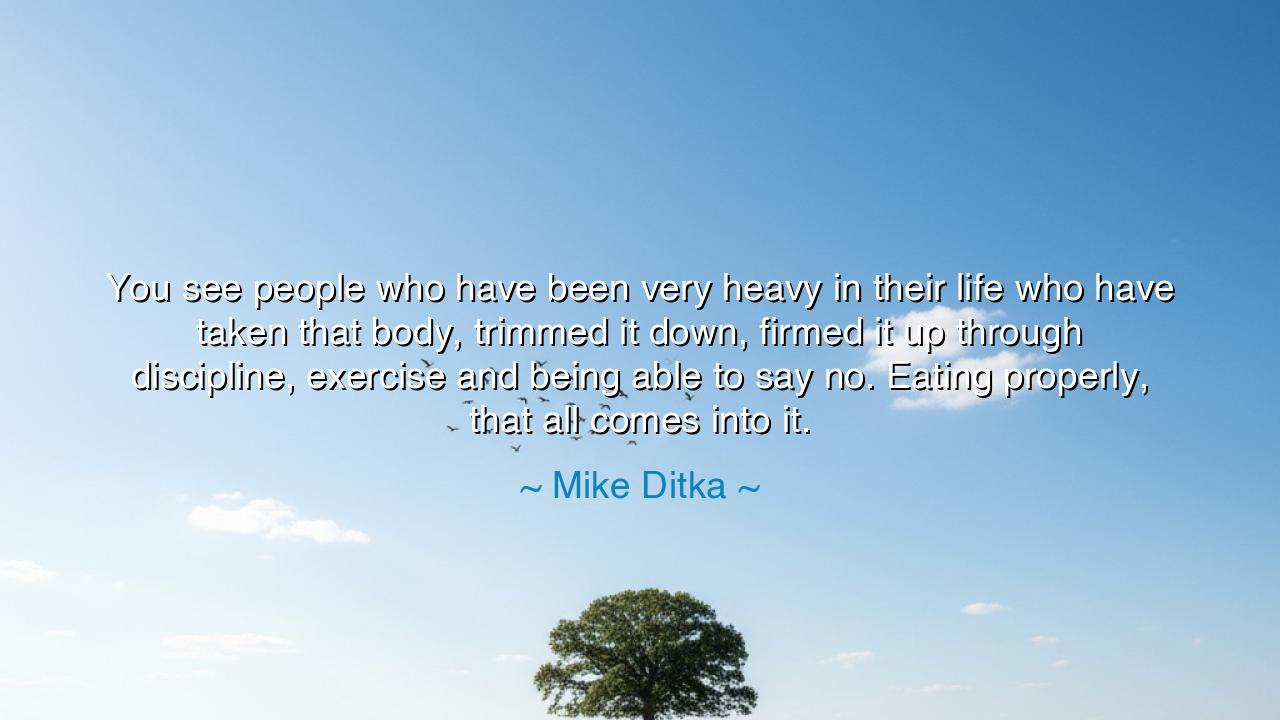
You see people who have been very heavy in their life who have
You see people who have been very heavy in their life who have taken that body, trimmed it down, firmed it up through discipline, exercise and being able to say no. Eating properly, that all comes into it.






In the rugged and powerful words of Mike Ditka, the great coach and man of iron will, there rings a truth forged in fire and perseverance: “You see people who have been very heavy in their life who have taken that body, trimmed it down, firmed it up through discipline, exercise and being able to say no. Eating properly, that all comes into it.” Though spoken in the plain speech of an athlete, the wisdom here is ancient — it is the song of discipline, the triumph of self-mastery, and the unbreakable law that the body and spirit rise only through effort. Ditka, a man who built his life on toughness, reminds us that transformation is not a matter of chance, but of choice — of daily struggle, sacrifice, and the sacred strength to say no to what weakens the self.
At the heart of Ditka’s teaching lies a principle that has guided warriors, philosophers, and sages throughout the ages: the power of discipline as the path to freedom. The body, left to ease and indulgence, grows soft; the mind, without restraint, becomes restless; the spirit, without struggle, loses its fire. Yet when a person decides to confront their weakness, to shape their body through effort and endurance, something far greater than muscle is formed — character. Ditka’s admiration is not merely for the slim or the strong, but for those who have fought to reclaim themselves — who have battled against temptation, pain, and laziness, and have emerged renewed. Such victories, though unseen by the world, are the greatest of all triumphs, for they are victories over the self.
In ancient Greece, this wisdom was enshrined in the very foundation of their culture. The athletes of Olympia were not worshipped merely for their strength, but for their discipline — their unwavering devotion to preparation. The philosopher Socrates, himself a man of reason, once declared that no citizen has the right to be an amateur in the matter of physical training. For to neglect the body, he said, is to dishonor the gift of life itself. The ancient Greeks saw the human form as a temple — not of vanity, but of balance between body and soul. Exercise, to them, was not mere motion, but meditation — a dialogue between will and flesh. And so Ditka’s words echo their eternal truth: that mastery of the body is a path to mastery of life.
But what does it mean to say no, as Ditka declares? It means to wield the sword of restraint — to recognize that not all desires are worthy of fulfillment. The one who can say no to excess, no to indulgence, no to the momentary comfort that leads to decay, is the one who holds dominion over their destiny. In every age, weakness has worn many faces — gluttony, sloth, pride — yet all are conquered by the same weapon: discipline sharpened through habit. This is the lesson of the athlete, the soldier, the monk, and the artist — that to say no to what harms you is to say yes to what will elevate you.
Consider the story of David Goggins, a man who once weighed nearly three hundred pounds, trapped by his own defeat. Yet one day, he made a decision — a single, defiant turning of the will. Through months of agony and relentless effort, he carved from his own flesh a symbol of transformation. He ran, he trained, he bled — and in doing so, he became more than a soldier or athlete; he became a testament to discipline’s power. His story mirrors Ditka’s truth: that through consistent effort, through exercise and the courage to refuse the easy path, the impossible becomes possible.
Ditka’s emphasis on eating properly may seem simple, yet it too holds spiritual meaning. To nourish the body wisely is to honor it; to eat without thought is to treat life carelessly. In every culture of wisdom, from the Stoics of Rome to the monks of the East, food has been seen not only as sustenance but as a test of moderation. The one who eats with gratitude and restraint feeds not only the body but the spirit. True health, Ditka reminds us, is not the reward of luck or wealth, but the fruit of mindful living — of patience, self-control, and balance.
The lesson, then, is clear and enduring: discipline is the foundation of freedom. If you would change your body, begin with your mind. If you would strengthen your mind, begin with your habits. Rise each day and honor the vessel that carries your soul. Move it, test it, strengthen it — not for vanity, but for vitality. Say no to what diminishes you, and yes to what builds you. For in every repetition, every choice of restraint, you are forging more than muscle — you are forging the will to live fully and with purpose.
So remember the wisdom of Mike Ditka: “Trimmed it down, firmed it up through discipline, exercise, and being able to say no.” Let these words be your creed. Do not curse the body you have, but shape it through effort and love. Do not envy the strong, but become strong through patience. For health and greatness are not given — they are earned. And in that sacred labor lies the true glory of being human: to rise each day, to conquer yourself, and to stand firm as living proof that discipline, not desire, is the path to freedom.






AAdministratorAdministrator
Welcome, honored guests. Please leave a comment, we will respond soon